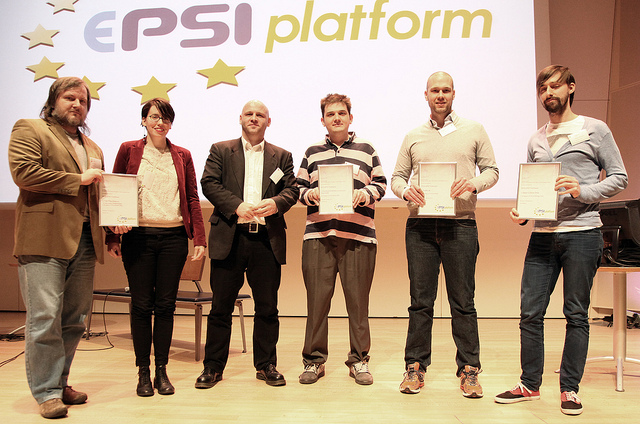On Friday the 16th of March, the European Public Service Information (ePSI) Platform conference was held in Rotterdam. More than 300 guests from all over the world gathered for what turned out to be a very busy and interesting day. In 15 sessions 60 speakers gave an overview on a wide variety of open data related issues. From key registries to data journalism, from pricing models to data visualisation and from local data to national data portals. See the full programme.
The conference, called “Taking re-use to the next level“, was opened by a warm welcome by Ms Korrie Louwes, vice-mayor of Rotterdam. See the video recording and the full text of her welcome speech.
The second welcome message came, by video, from EC VP Commissioner Neelie Kroes, responsible for the Digital Agenda. She called upon the conference participants to go out and make the case for open data more strongly. Explaining the proposed EU open data strategy Commissioner Kroes also made clear that it is not enough to just rely on the legislative process, as work needs to be done on cultural change as well. Practical examples of open data re-use, and grass roots support and experiences play an important role here. “Dare to try!“, and thus help make the case for Open Data, and showing every public sector body in the EU that “opening data will pay off“. See full video message by Mrs. Neelie Kroes.
Plenary I: The revised PSI Directive
The welcoming notes were followed by a panel discussion on the proposed amendment of the PSI Directive with Richard Swetenham (Headof Unit DG INFSO of the European Commission), Chris Taggart (CEO & Co-Founder OpenCorporates), Peter Hecker (Chairman of GEOkomm Germany) and Anton Eliassen (Director National Meteo Institute Norway and former Chair ECOMET Council).
Plenary I: The revised PSI Directive from ePSI platform on Vimeo.
The discussion was opened by Marc de Vries from the ePSI platform with an overview on the Directive and the proposed amendments. In short the main areas of changes to the PSI Directive as proposed in the European Commission’s “Open Data Strategy” in December 2011 are:
- All data made available by government institutions must be able to be generally used for commercial and non-commercial purposes;
- In principle, the costs charged by government institutions may not exceed the costs involved in the individual request for information (marginal costs – in practice usually free of charge);
- Member States must introduce regulatory supervision to monitor compliance with the aforementioned principles;
- the scope of the Directive will be extended to include information from libraries, museums and archives.
Plenary 2 – Vistas of Open Data, what are the pockets of new initiatives?
The second panel with Brigitte Zonneveld (Dutch Ministry of Economic Affairs, Agriculture and Innovation), Francois Bancilhon (CEO of Data Publica, France) and Andrew Stott (former Director for Transparency and digital engagement UK Cabinet Office) was moderated by Ton Zijlstra. See the discussion.
Plenary II: Vistas of Open Data, what´s ahead from ePSI platform on Vimeo.
ePSI Trailblazers 2012
At the end of the second Plenary the winners of the ePSI Trailblazers were awarded on stage. The ePSI trailblazers are innovative ‘trailblazers’, who’ve done something new and exciting re-using PSI. You can visit the ePSI Trailblazers here.
The two Plenary Sessions were followed 12 sessions in the form of workshops facilitated by speakers and moderators on a variety of topics such as local Open Data initiatives, role of competition authorities, Open Data as business model for the public sector, data journalism, and much more. Check out the video recordings from some of the sessions and pictures from the conference.
There is also this very nice video from Elmine Wijnia
ePSI conference 2012: taking re-use to the next level from Elmine Wijnia on Vimeo.
Daniel Dietrich is a digital rights and freedom of speech enthusiast. He focuses on research and policy around open data, open government and transparency and is author of several studies on those topics. He is the Chairman of the German Chapter of the Open Knowledge Foundation and works for the OKF since 2009 as an open data evangelist.









